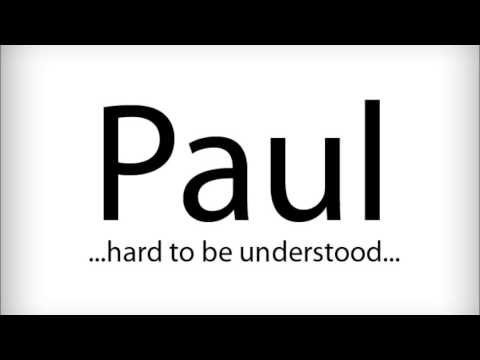Paul is the Benjamite ravenous wolf: The Many Confusions Of Paul
Today I want to share something religious. I usually don't like talking religion as people always see me as a critic. But within me, I know it's not true. I am just different because I look at things rationally and not swallow everything that comes my way. So you know, am a devoted Christian, a child of the light, and my prayer for you as you read this article is to go through it with an open mind. You can criticize or add to what I have to say but do it like an exposed person and not like an illiterate.
So today I want to talk about Paul and the many confusions he brought into the Christian faith.
You see, With Jesus there was one shepherd, one faith and one baptism. But thanks to Paul, there are now thousands of Christian denominations.

Jesus says: “Beware of false prophets who come to you in sheep’s clothing, but inwardly they are ravening wolves. You shall know them by their fruits.” (Matthew 7:15-16). This echoes Jacob’s prophecy: “Benjamin is a ravenous wolf; in the morning he shall devour the prey, and at night he shall divide the spoil.” (Genesis 49:27).
And Paul confirmed his Benjamite roots: “I am of the tribe of Benjamin.” (Romans 11:1). As a Benjamite, Paul fulfils Jacob’s prophecy of devouring the prey by participating in the killing of Christians. (Acts 7:58-59). He divides the spoil by being responsible for the denominational divisions of Christianity. Indeed, he tells Christians with deep cynicism: “There must be factions among you in order that those who are genuine among you may be recognized.” (1 Corinthians 11:19).
Outright lie Paul says Jesus sent him to the Gentiles and sent Peter to the Jews: “I had been entrusted with the gospel to the uncircumcised, just as Peter had been entrusted with the gospel to the circumcised (for he who worked through Peter for his apostolic ministry to the circumcised worked also through me for mine to the Gentiles).” (Galatians 2:7-8). This is another one of Paul’s many lies.

Jesus prescribed no such division of labour. When he resurrected, he sent his disciples to everyone everywhere: “Go therefore and make disciples of all nations, baptizing them in the name of the Father and of the Son and of the Holy Spirit, teaching them to observe all that I have commanded you.” (Matthew 28:19-20).
Indeed, it was Peter, and not Paul, that God used to open the door of faith to Gentiles through Cornelius: “Peter stood up and said to them, “Brothers, you know that in the early days God made a choice among you, that by my mouth the Gentiles should hear the word of the gospel and believe.” (Acts 15:7).
Paul initially preached to Jews; but they rejected a messiah allegedly sacrificed for sins. He admits this himself: “We preach that Christ was nailed to a cross. Most Jews have problems with this.” (1 Corinthians 1:23). Paul cannot claim he was called exclusively to the Gentiles when he only switched to Gentiles because Jews rejected him: “When the Jewish people saw the crowds, they were very jealous. They insulted Paul and spoke against everything he said. But Paul and Barnabas bravely said: We had to tell God’s message to you before we told it to anyone else. But you rejected the message! This proves that you don’t deserve eternal life. Now we are going to the Gentiles.” (Acts 13:45-46).
Paul used the lie of a division of labour to divide Jewish Christians from Gentile Christians. He then divided even the Gentiles between themselves because contradictory doctrinal views abound in his epistles as he sought, in his own words, to be “all things to all men.” (1 Corinthians 9:22). This makes it difficult to pin Paul down to any position. He is hypocritically on all sides of every debate.
And the worst contradictions that was engendered by Paul was in answering the question ' Is baptism necessary for salvation?' In answer to that, Paul says it is not: “Christ did not send me to baptize, but to preach the gospel.” (1 Corinthians 1:17). Nevertheless, Paul baptized so many people: “Paul and Silas told him and everyone else in his house about the Lord. While it was still night, the jailer took them to a place where he could wash their cuts and bruises. Then he and everyone in his home were baptized.” (Acts 16:32-33). “After the people heard Paul say this, they were baptized in the name of the Lord Jesus.” (Acts 19:5). Moreover, the same Paul who claims Christ did not send him to baptize contradicts himself by teaching that baptism is necessary for salvation: “As many of you as were baptized into Christ have put on Christ.” (Galatians 3:27).
Another contradiction was also in answer to the question 'Does a believer need to be circumcised?' and in answer to this, Paul says he does not: “I Paul say to you, that if you undergo circumcision, Christ will be of no use to you. Yes, I give witness again to every man who undergoes circumcision, that he will have to keep all the law. You are cut off from Christ.” (Galatians 5:2-4). But then the same Paul contradicts himself by forcing Timothy to be circumcised: “(Paul) took him and circumcised him because of the Jews who were in that region.” (Acts 16:3).
Same goes with the question 'Is it wrong to eat meat offered to idols?' In answer to this, Paul says it is wrong: “You cannot partake of the Lord’s table and of the table of demons.” (1 Corinthians 10:21). And then he says it is not: “Food does not commend us to God; for neither if we eat are we the better, nor if we do not eat are we the worse.” (1 Corinthians 8:8).
And then i ask myself is Double-mindedness the moral law necessary for salvation? Absolutely, says Paul: “Neither fornicators, nor adulterers will inherit the kingdom of God.” (1 Corinthians 6:9-10). However, he then contradicts this by making these sins permissible: “All things are lawful unto me.” (1 Corinthians 6:12). How can all things be lawful when sin is the transgression of the law? (1 John 3:4). How can all things be lawful when Paul says: “I myself serve the law of God.” (Romans 7:25). Go figure!
Are we justified by the law or not? Paul says we are: “The doers of the law will be justified.” (Romans 2:13). Then he changes his mind and says we are not: “By the deeds of the law no flesh will be justified. (Romans 3:20).
Does repentance from sin lead to salvation? Paul says it does not: “The gifts and calling of God are without repentance.” (Romans 11:29). Then he changes his mind and says it does: “Godly sorrow produces repentance leading to salvation.” (2 Corinthians 7:10).
Are the commandments of God any good? Paul says they are not: “The commandment, which was to bring life, I found to bring death.” (Romans 7:10). Then he changes his mind and says of the same allegedly “deadly” commandments: “The Law and its commands are holy and correct and good.” (Romans 7:12). Are sacrifices to continue after the death of Jesus? Paul says “No;” on the grounds that: “Christ is the end of the law.” (Romans 10:4). But then, at the instance of James, Paul agrees to perform Nazarite rites according to the law which included the sacrifice of a ram: “The next day (Paul) purified himself along with them and went into the temple, giving notice when the days of purification would be fulfilled and the offering presented for each one of them.” (Acts 21:26).
Confusion galore Paul says in one breath: the law brings God’s wrath and curses. (Romans 4:15; Galatians 3:10). Then he says in another: the law is “holy,” “spiritual” and “good.” (Romans 7:12-16). He says: “We are discharged from the law, dead to that which held us captive. (Romans 7:6). Then he says Christians should “uphold the law.” (Romans 3:31).
With Jesus, there was one shepherd, one faith and one baptism. But thanks to Paul, there are now thousands of Christian denominations; each with its own shepherd and doctrine. Paul is the author of this confusion. He is: “a double minded man, unstable in all his ways.” (James 1:8)
When I read through his many confusions, i wonder why he had to put Christianity in such a state. Could it be because he was just a human being like anyone else? You can rub minds with me on this...but please, tackle this with open mindedness and not as a drunk person, drunk with religion "the Opium of the masses"
PEACE!
Paul was selected as the leading rabbi of his generation by Jesus. This fact was acknowledged by Peter, John and James at the Jerusalem Council in Acts 15. Peter himself confirmed that Paul's letters were scripture.
On top of that, John lived in Ephesus for another whole generation or so after Paul was executed in 67 AD. He had plenty of time and plenty of authority to stamp out all Paul's teachings if they were false.
In every generation, from the early Church Fathers to Augustine, Aquinas, Luther, Calvin, Wesley, Edwards, Spurgeon, Lewis, Graham, and on and on great scholars of the Bible have analyzed and taught the teachings of the Apostle Paul as the deepest and most learned of all the Scriptures. That was the job God gave Paul - to take Christianity beyond where fishermen and tax collectors could take it and harmonize it with all the prior Scriptures that he had studied as a Pharisee under Gamaliel.
Everything Paul says holds together perfectly if you take the time to understand it. Every single apparent contradiction is an opportunity to increase your understanding of the deeper truths.
I get your point...But you didnt say anything about his many confusions...his wonderful ability to say one thing and say exactly the opposite the next moment...was it circumstancial? or was he trying to please the people involved at that particular moment?